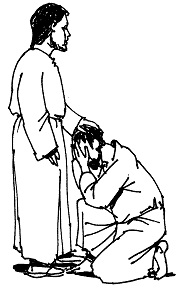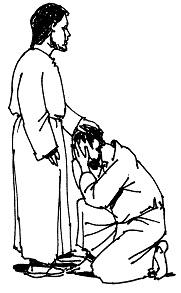
Advertisement

“Lord, if you wish, you can make me clean” (Matt 8:3).
2 Kgs 25:1-12; Matt 8:1-4
Jesus’ encounter with a leper is filled with a pathos that suggests the man’s disease was only the surface of his suffering. His disfigured face and skin had already isolated him from the community, his family and the religious life of his culture, but what made his condition feel hopeless was the assumption that even God had rejected him and was punishing him for some unnamed sin.
When Jesus came down the hillside after completing his Sermon on the Mount, the crowd of disciples surrounding him likely scattered as the leper approached and bowed to the ground before him. His trembling plea for healing was filled with hesitation. “If you wish…” suggests that he was prepared for rejection, but Jesus instead does the unthinkable. He stretches out his hand and touches the leper, reassuring him, “I will do it. Be made clean.”
With that touch, Jesus lifts both the scourge of leprosy and the theological reproach the man has carried as part of the social stigma inflicted on him by social fear of contagion. Jesus heals him and restores him to the community by an act of compassion and a profound spiritual corrective to show the crowd that God does not inflict disease on anyone to punish them.
Remarkably, today’s Gospel is paired with a dramatic account from 2 Kings that describes the origins of the hated Samaritans. They were Jews left behind when Babylon razed Jerusalem and deported most of its population in 6th century BCE. While important figures from the royal house, military and craftsman classes were taken to Babylon, the poor were abandoned in the ruins of Israel to survive as farmers.
When the Jews returned to their home from Babylon on the orders of Cyrus the Persian, the people left behind were rejected as collaborators, heretics and racially unclean by intermarriage with pagans. A long history of tension and hatred between Jews and Samaritans made them outcasts in the time of Jesus. Yet his attitude to them was like his engagement with lepers. The famous story of the “Good Samaritan” was Jesus’ rebuke to his brother Jews for their legal myopia and blood purity prejudice. God’s love encompassed everyone. For Jesus, no one was untouchable.
This might be ancient history if the same religious and racial divisions were not alive and well in today’s so-called modern world. Division now threatens the American democracy and a two-state solution in the Middle East and is pervasive in nationalist policies toward immigration and refugees, distribution of resources, healthcare, and basic human rights.
Jesus is an uncomfortable truth and example in our world today, and his disciples are called to imitate him by seeing God’s image in every human being and to respond with compassion for others, especially the poor and suffering among us.








